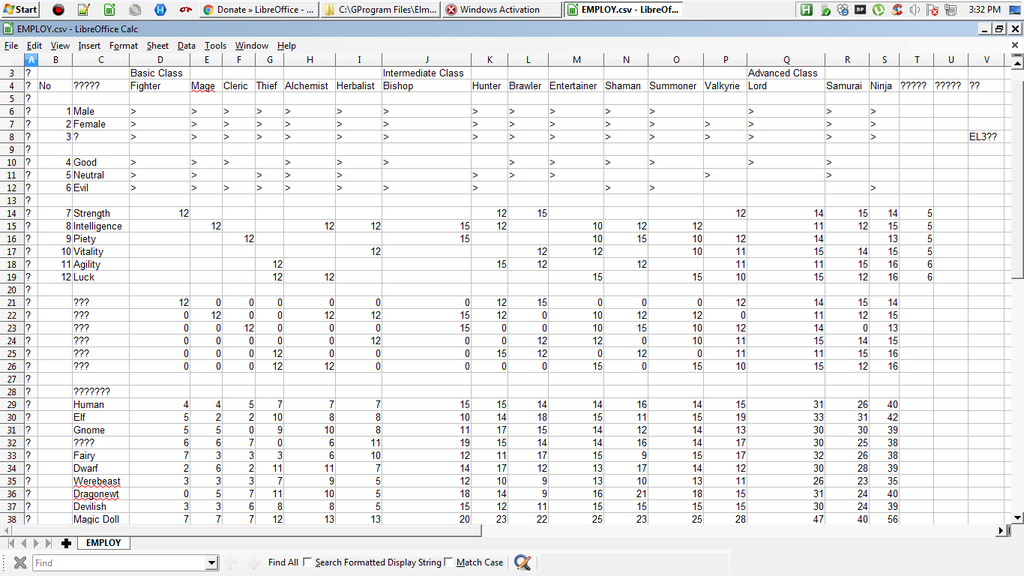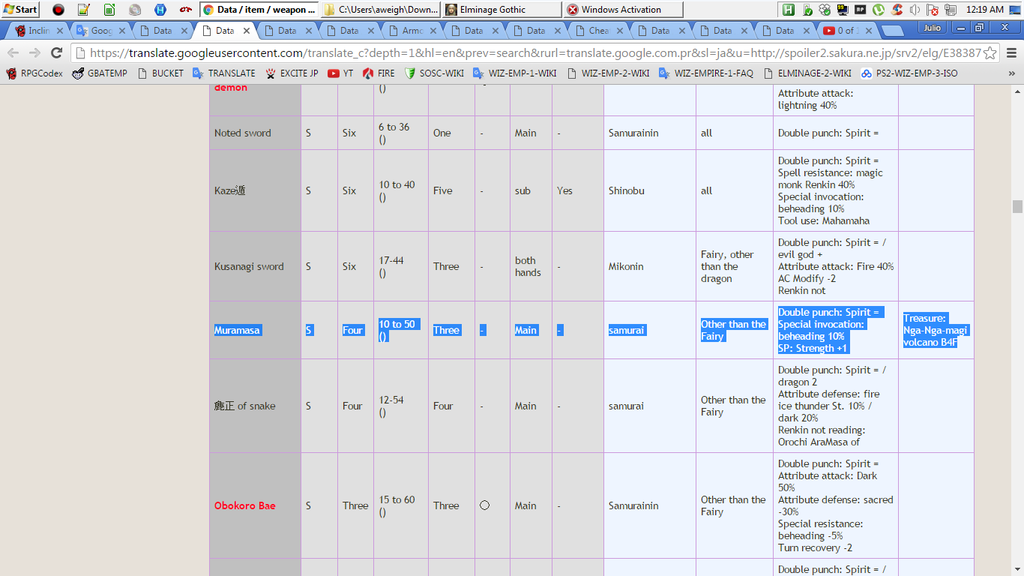i'm having trouble getting the selectable ex-skill "Identification" to work; however adding the skill itself to other character classes works 100%. :\
Could arguably slap Identification onto Shamans and Servants and pretend it's part of their "craft", with Shaman's divining that shit and Servants appraising like a jeweler (they are business-people after all, despite the name).
agris
what exactly would you specifically say needs changing in your opinion? E: Gothic itself is not actually reliant on the player knowing meta-knowledge at all. I'm sorry if I perhaps gave off that impression (the enemy loot-stealing was a developer oversight); the fact is that E: Gothic is a very long, very deep game in the literal defintion: it is a game that rewards the player more and more as they play it.
E: Gothic is the type of RPG that you will spend 25 hours playing and then you will think you are beginning to understand the game and then you will reach hour 55 and you will realize that what you understood about how to make your way through the game was rightfully ignorant because, quite frankly, the game itself is not static or obtuse.
it is cryptic, and it challenges the player to
experiment. There are simply so many moving parts in E: Gothic that it is
impossible for one playthrough to fully grasp all of the nuances. I did not actually ever even use a Bard, or a Hunter, until my 2nd playthrough of the story-dungeons, and I did not grasp the true importance of the Hunter's lightning strike ability as effective crowd control until well 100+ hours of playing.
I want you to keep in mind that my recent posts on this thread have been coming from someone who has already played a
lot of the game itself and is merely thinking about making changes to the game so as to keep it fresher. These changes are actually not necessary
at all. A Bishop identifies items and there is a very legitimate and profound reason for this, and I have typed extremely long posts detailing the genesis of the Bishop and his/her role in the Wizardry/Elminage party and more importantly the psychological impetus for the creation of the Bishop. Unfortunately I simply can't type out the Bishop pseudo-essay right now, but long story short the Bishop is there primarily to play with the psychology of the player's logistical methodology of dungeon exploration. There is no
need whatsoever for the Identification skill to be an Ex-Skill; this is something I want to do because I, as I mentioned, I wish to change the game up and play it more.
The game as-is, out-of-the-box, is probably the most rock-solid system array of mechanical systems in any RPG I've ever seen and it easily surpasses any Wizardry in terms of scope and complexity and depth.
Take for example what I mentioned earlier about the 1st dungeon's floor Master carrying a l33t Scythe-type weapon. I can somewhat understand you feeling like you are "missing out" on something if you killed him and never knew you could leave them alive so you could later on steal their weapons with a Thief... but you have to understand that this is not in any way, shape or form, a mistake by the developer or anything approaching "bad design". Think about it, man: how on earth are you supposed to know you can steal shit from the 1st dungeon's Doom Cricket? Thieves don't get their ability to steal until their Class-level 26!!!!
This is
intentional. And it is also the reason why stuff such as floor masters are
optional. This is a type of game that generates die-hard fans because it doesn't insult their intelligence. It provides an exceptional variety and amount of classes and ways to build a party and ways to play through the game that, dude, i've spent around 85 hours on E: Original and around 250 hours (total, across playthroughs) playing E: Gothic and
I AM STILL FINDING OUT SHIT I DIDN'T KNOW, AND I AM STILL FINDING NEW WAYS TO PLAY THROUGH AREAS, AND I AM STILL FINDING NEW WAYS TO TAKE DOWN ENEMIES I'VE DEFEATED MANY TIMES BEFORE.
There is literally
no way for the player to know that the 1st dungeon's Doom Cricket floor master is vulnerable to Charm. Once again I reiterate that this is by design, and we, the players, are thankful for it and appreciative. This is for YOU, the player, to
learn. To
experiment. To use those classes you never used before because they did not seem powerful enough!
THIS is the the kind of *real* "C&C", (choices and consequences), that an RPG should feature in a primary manner;
not the usual Branching Story State A-B-C scenarios that produce ultimately extremely questionable gameplay/game-playing experiences for the player.
I mean, sure, if you tell me specifically what it is that you'd like to see changed I will do it, no problem. For example, if you feel you levelling is too slow, as a lot of people do (it's fine... much faster than comparable japanese 'crawlers for sure) I can upload a .CSV file with more XP from enemies, or a faster XP progression table for classes.
However we must also talk about the game's difficulty. E: Gothic is not an uber hard-core game like Wizardry 4, quite the contrary, but it is not a cake-walk. Take as an example, a
perfect example, the Rizefus spell details I mentioned in the above posts. It is 100% true that in E: Gothic resurrection spells come out-of-the-box with lower success-rates of healthy resurrection than the previous Elminage games. I've actually, in my entire 80+ hours of E: Original,
never ever had someone turn to Ashes from using Rizefus! In E: Gothic it happens all the time.
Again, I repeat: this is
intentional. E: Gothic was made by Starfish as loving homage to the tense, exciting and often challenging and always thrilling to overcome gameplay directions of classic Wizardry games, specifically Wizardry games 1-5. Resurrecting homies in Wiz 1-5 was even dicier than in E: Gothic, and guess what? In Wiz 1-5 every resurrection, even if successful (!), would take away 1 point of VITALITY from the resurrected character! haha
talk about serious business! It is obviously 100% logical and 100% contextual: of course you lose 1 point of VITALITY from a resurrection... it makes all the fucking sense in the world. Does that make things more "difficult" for the player? Mmm.... my answer is 'No'. It makes things more
interesting for the player.
the ageing in E: Gothic is also a direct tribute to the incredible legacy of Wizardry games, specifically Wizardry 1-5. Wizardry characters aged and life was
harsh. Of
course an ageing character will gain Attributes much slower when he or she is in their 40's and 50's and 60's than when they were in their 20's and 30's; it is only
logical. however these games are not simulations, they are the complete opposite: Wizardry and Elminage are the ultimate abstraction of an RPG adventure.
the game does not want to punish the player, in actuality Wiz and Elminage want the player to realize that, just like in real life, everything that has a beginning must eventually have an ending. Characters die, stupid decisions can lead to annihilation, but it goes without saying that the the player is not being punished he or she is being
educated and indoctrinated in his or her entirety into the world of this game.
i guarantee that in no other RPG you will experience situations like the scenarios one can find oneself while playing something like Wizardry or Elminage and that your suspension of disbelief *will* be complete: you will fear for your characters dying, but you will also accept it and make new ones, or perhaps you will manage to stumble upon one of the fountains that regenerate youth in the game; perhaps you will decide to roll an Alchemist, a character class that receives as their ultimate spell one which raises primary Attribute scores permanently upon casting.
subtle gameplay nuances such as the ones I just mentioned, things like characters agueing, or things like clearing a dungeon and having to run from a crazed dungeon boss you know nothing about and which seems completely unbeatable, and of course: things like character Attribute scores lowering on a level up because you're getting older, only to reach the
next level and be greeted with a triumphant super-roll of hit points (the game keeps track of everything!).
these things are masterful in that they help to slowly teach the player many, many things about the game, and many things about how to PLAY the game, and ultimately it is a growing and maturation that occurs between the player and the game. It is not the player
versus the game, rather it is the player ready, able and willing to jump into the unknown abyss and explore and ultimately conquer and in the process learn more about himself or herself as a person who plays video games.



















